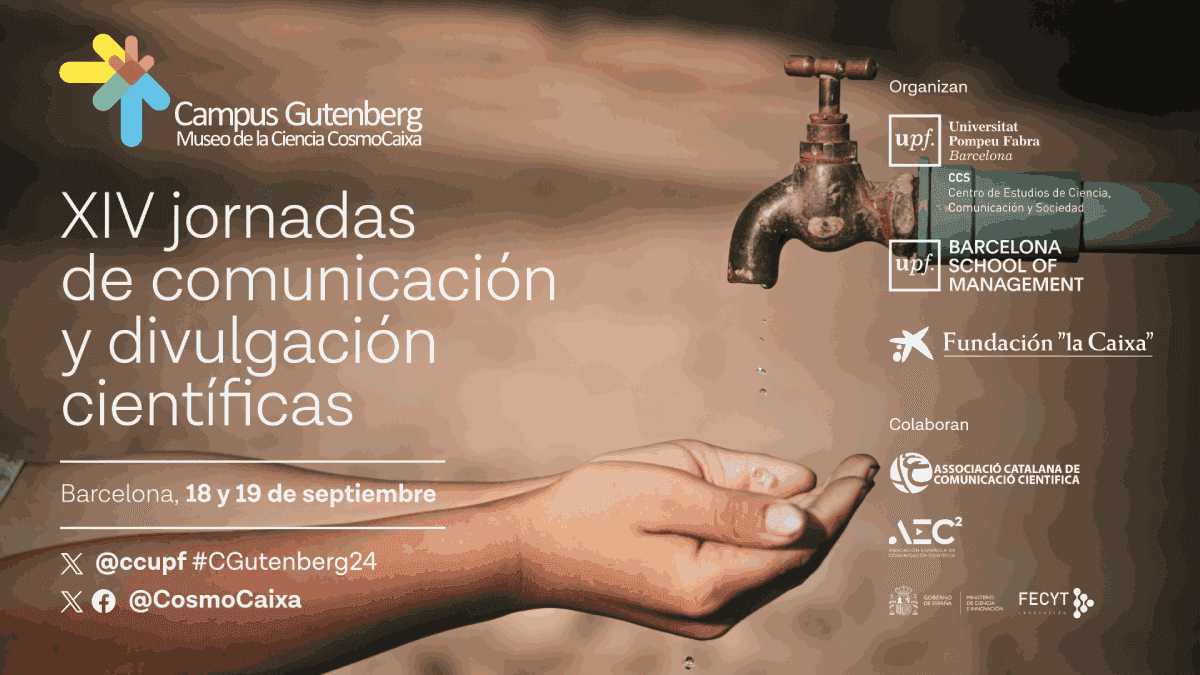The 14th Scientific Communication and Outreach Conference focuses on drought
19 Septiembre - 2024On September 18 and 19, we were thrilled to take part in the Gutenberg Campus, an annual conference for scientific communication and outreach professionals. The key theme of this year’s conference was drought, a critical challenge that over 300 specialists came to discuss.
The event is designed for professionals in the sector with a program that is adapted in collaboration with the participants, This year’s edition comprised more than 40 sessions, including workshops, debates, conferences and idea laboratories, all of which focused on exploring and tackling the complex problems associated with drought and its communication.
Key reflections on climate change
The first day of the conference, September 18, included sessions with key speakers, such as José Manuel Martínez-Sierra, the Director General of the UPF Barcelona School of Management, who opened the conference with a speech underlining the urgency of tackling the climate crisis. In his speech, Martínez-Sierra emphasized the vital role of scientists and scientific communicators in our society, calling on political, social and cultural leaders to advocate and embrace scientific truth and passionately support evidence-based initiatives. Moreover, he highlighted the importance of protecting the freedom and independence of scientific communicators in order to ensure a prosperous, sustainable society.
It was then the turn of Valentí Farràs, the Director of the Caixa Science Museum, who also underlined the importance of science in modern society. Farràs emphasized the need to fight against climate denial, stressing the crucial role of scientists in tackling climate change. He called for urgent action and the firm commitment of political and social leaders to support science and its initiatives.
Gema Revuelta, the Director of the Centre of Science, Communication and Society Studies of the Pompeu Fabra University, was commended for her contribution in creating such an inspiring conference. Her efforts have been fundamental in organizing an event that fosters dialogue and reflection on the challenge of communicating drought and other environmental challenges.
The challenges of communicating the drought issue
The first round table panel focused on the complex challenges of communicating the issue of drought, a problem that goes far beyond simply conveying information. María del Carmen Llasat, the Professor of Atmospheric Physics at Barcelona University, explained how drought occurs in its different forms and the crucial importance of not only informing the general public but also educating and raising society’s awareness. Narcís Prat, an ecologist and professor at the same university, went on to emphasize the need to manage aquatic ecosystems effectively and the importance of connecting with the general public to foster a culture of water management. Next, José María Montero, the Director of the television programs “Tierra y Mar” (“Land and Sea”) and “Espacio Protegido” (“Protected Area”) on RTVA’s Canal Sur, highlighted the role of the media in avoiding sensationalism and giving a balanced and analytical overview of the issue. María Jose Picó, a journalist specializing in science and the environment, unlined the need for rigorous scientific outreach in order to mobilize society to work towards effective solutions.
Communicating research at the cutting edge of knowledge
The second day began by focusing on the challenges of communicating basic, non-applied science, which often receives less coverage in the media and outreach activities, despite its relevance in terms of understanding fundamental problems. Heber Longás, the scientific and biological infographic designer, discussed the crucial role of infographics for simplifying complex science and making it more attractive and accessible. Ana Belén Martínez, a communication specialist at ALBA Synchrotron Light Source, gave an overview of strategies for communicating advances in innovative projects. Javier Pérez Barbuzano, a scientific journalist, emphasized the importance of going far beyond superficial opinions and promoting a more in-depth understanding of basic research.
The 14th edition of the Scientific Communication and Outreach Conference continued to consolidate the event’s status as an essential platform for exchanging ideas and strengthening scientific communication in relation to critical environmental problems.

